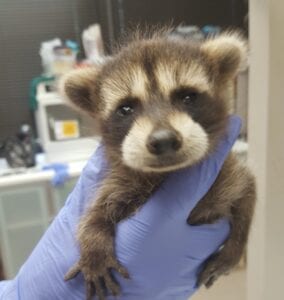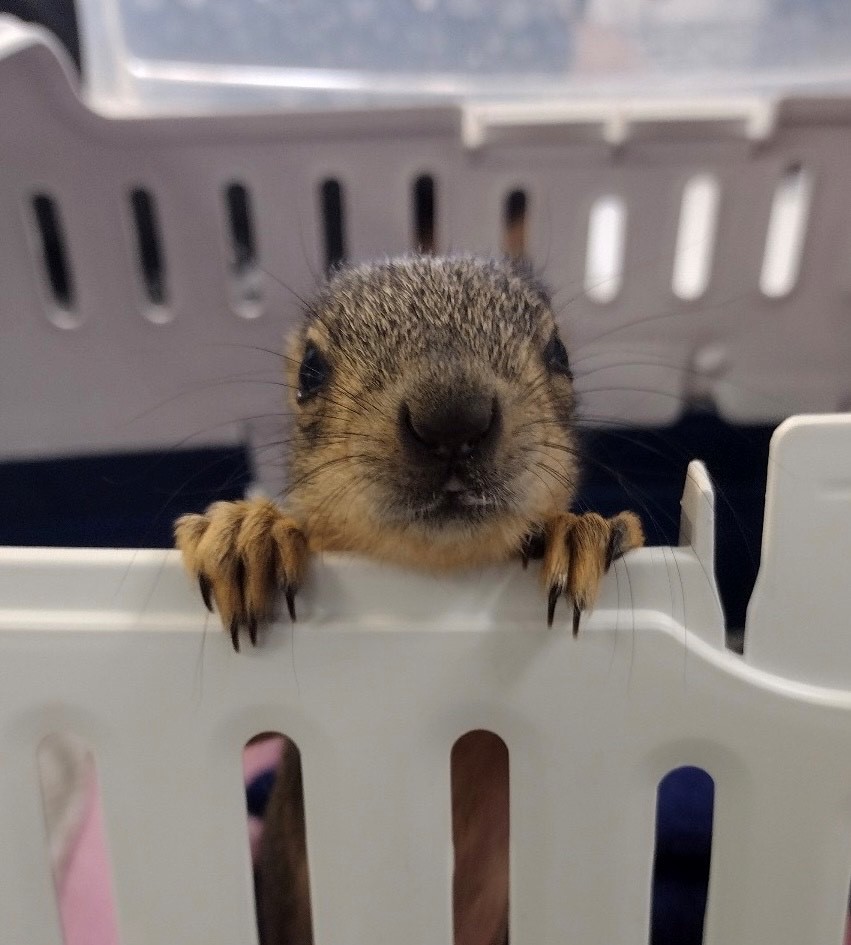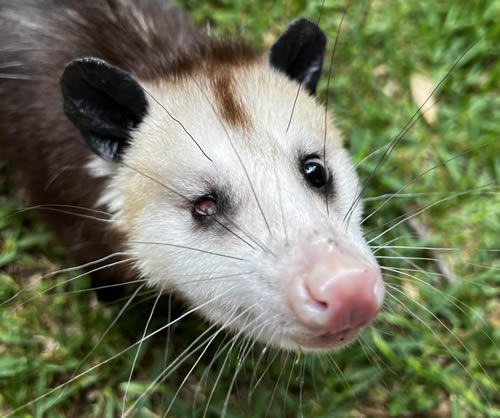RABIES VECTOR SPECIES - POTENTIAL EXPOSURE
Please call 713-767-3300 for Zoonosis Control if there was a potential rabies exposure
WE ARE CURRENTLY NOT ACCEPTING ADMISSIONS FOR THIS SPECIES. PLEASE VISIT ANIMAL HELP NOW TO FIND A WILDLIFE CENTER THAT IS ACCEPTING THEM NEAR YOU.
Have you found a BABY raccoon?

Raccoons are often orphaned unnecessarily when a homeowner hears activity in their attic and hires a pest control company to remove them. Often the company will trap the parents and relocate them, overlooking the babies, and the homeowner will hear the babies crying within a day or so. If you have raccoons in your attic, please call us at 713-468-8972. We can advise you on passive methods that will compel the raccoon to relocate on their own, taking any babies they have with them.
If able, please attempt to reunite the baby with its mother. Please do not attempt this if the baby is:
- Caught by a cat or dog
- Visibly injured
- Unable to walk
- Limping or dragging a limb
- Lethargic (stays in one area for long periods of time)
- Covered in ants, flies, or fly eggs
- Found in an unsafe area (ex: parking lot with no green space around)
We would suggest taking it to a wildlife center for care. Give us a call at 713-468-8972 for further assistance or use Animal Help Now to find a center near you.
If none of the above situations apply, we would suggest trying to reunite the baby with its parents.
Reunite Instructions:
- Prepare a cardboard box by lining it with T-Shirt material. If the babies are mobile, use a container that they cannot get out of, but the mother can get into. We always suggest using a blanket or gloves when handling raccoons.
Note If Babies Can Escape From Box: An upside-down laundry basket with a weight on top (such as a heavy book) works well as the babies will not be able to lift the basket, but the mother will be able to push the basket over, freeing her babies. Another possibility is a tall plastic trash can or recycling bin.
- Warm the baby if it is cold. Place the raccoon in a box and put the box half-on half-off a heating pad set on low.
Note: Other warming methods include, heating a towel in a dryer and wrapping the baby with it, using a rice sock or plastic bottle filled with hot water wrapped in cloth.
- If the raccoon(s) does not warm up after this, it could be lethargic. Call us at 713-468-8972 to bring the raccoon to a wildlife center or rehabber.
- Once the baby is warm place them in the cardboard box. Cover the container with a lightweight sheet.
- Place the container in the shade and leave them out from the time they are found until the following morning. The mother will try to retrieve them overnight.
- If the mother does not retrieve her babies, make arrangements to bring them to a wildlife center or rehabber. Use Animal Help Now to find one near you.
Have you found an OLDER baby Raccoon?
If the babies are mobile enough that containing them is not possible, it is best to simply monitor their condition over several days. If they appear healthy and active, they should be left alone. If they appear weaker or in distress (frequent vocalizing, approaching people), they should be brought to a wildlife center or rehabber. Use Animal Help Now to find one near you.
Have you found an INJURED or ILL adult raccoon?
PLEASE DO NOT TOUCH THE ANIMAL. Adult raccoons are very dangerous and are a rabies vector species. Call your county’s Animal Control agency for help with an injured or ill adult raccoon.
Temporary Care Instructions for ALL Animals:
- Houston Humane Society Wildlife Center (HHS Wildlife Center) recommends that you wear gloves or use a cloth barrier when handling wildlife.
- Prepare an appropriate-sized cardboard box by poking air holes in the top and placing a soft cloth (T-Shirt, towel, paper towels) in the bottom. DO NOT put the animal into a plastic bag.
- Place the animal into the prepared box and tape the box shut. For injured adults, place the box on its side next to the animal and use a stick, broom, or rolled-up newspaper to gently push the animal into the box.
- Do not give the animal any food or liquids. Feeding an animal an incorrect diet can result in injury or death. In addition, rescued animals can get wet from liquids and become hypothermic and/or spill food on their fur/feathers, potentially causing damage.
- Keep the animal in a warm, dark, quiet place. Darkness makes the animal feel more secure. If the animal is a baby, the box can be placed half on and half off a heating pad set on low. If the animal gets too warm it will move to the other end of the box. Do not place adult animals on a heating pad.
- Leave the animal alone. Human noise, touch, and eye contact are very stressful to wild animals and can result in shock or even death. This is especially important in the case of injured or adult animals.
- If an animal has been caught by a cat or dog, please call HHS Wildlife Center immediately at 713-468-8972. Even if wounds are not visible, the animal needs medical intervention as soon as possible.
- Keep children and pets away. BE CAREFUL! An animal that is hurt or frightened may bite.
- Call HHS Wildlife Center at 713-468-8972 as soon as possible!
General Information about Raccoons in the Houston Area
Raccoons (Procyon lotor) are nocturnal (mostly active at night), but will come out during daytime rarely if they are chased or there is low food availability. Their Latin name “lotor”, means “the washer” because they are known to wash their food before eating it.
They are most active in spring, summer, and fall, and will sleep in their dens for most of the winter. Reproduction begins in late winter. Females, or sows, usually give birth to 1-6 baby kits in the spring. Mothers are very protective of their young until they separate after about a year. At HHS Wildlife Center, we see baby raccoons come in heavily from March - July.
Raccoons can carry several bacterial diseases and parasites that can be transmitted to humans and pets through a bite or the ingestion of raccoon waste. Some diseases that can affect humans and pets include: leptospirosis, salmonella, roundworm, and rabies. A raccoon’s life span is about 2-3 years.


